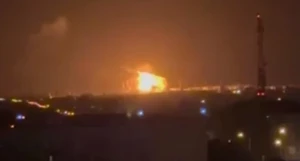
Kakhovka hydroelectric power plant destruction is new dimension of Russian atrocities and violation of humanitarian law – EU
The European Union condemns the Russian attack on the Kakhovka hydroelectric power station, which has endangered the lives of hundreds of thousands of civilians in about 80 settlements, including the city of Kherson
The EU High Representative for Foreign Affairs and Security Policy Josep Borrell and European Commissioner for Humanitarian Aid and Crisis Management Janez Lenarčič said this in a joint statement.
"This attack represents a new dimension of Russian atrocities and may constitute a violation of international law, notably international humanitarian law," the European Commission representatives said.
The statement emphasizes that the drop in water levels due to the hydroelectric power plant explosion also affects access to water for cooling the reactors of the Zaporizhzhia NPP.
"With this desperate act, Russia is also continuing its reckless nuclear gamble by putting at risk the proper functioning of the safety and security systems of the ZNPP," the statement said.
Borrell and Lenarčič noted that they remain in touch with the Ukrainian authorities to ensure immediate assistance from the EU.
"Ukraine can request assistance under the EU Civil Protection Mechanism (UCPM). We stand ready to address any immediate needs, including food and drinking water." the statement said.
Borrell and Lenarčić added that they would demand that all commanders, perpetrators and accomplices of war crimes be brought to justice.
They also support President Volodymyr Zelenskyy's peace formula and call on international partners to support it as well.
What is known about Kakhovka HPP
The invading Russian army seized the main structure of the North Crimean Canal and the Kakhovka HPP on February 24 last year. The Kakhovka HPP is located 5 km from the Russian-occupied Nova Kakhovka. Water intake for the North Crimean Canal, which has been unblocked by the occupiers since the beginning of the invasion, is carried out in the Kakhovka reservoir.
This hydroelectric power plant is the lower and last (sixth) stage in the Dnipro reservoir cascade. The hydroelectric power plant near Nova Kakhovka ensures the annual regulation of the Dnipro river flow to ensure that the southern part of Ukraine has electricity and water.
On October 20, 2022, Ukrainian President Volodymyr Zelenskyy warned that Russia was preparing to stage a new large-scale terrorist attack – to blow up the dam of the Kakhovka hydroelectric power plant in Kherson region. At the same time, he listed other consequences that could result from the explosion of the Kakhovka HPP and its dam:
- Hundreds of thousands of residents of southern Ukraine will be in the danger zone and may suffer from the flood;
- water supply to a large part of southern Ukraine and Crimea may be disrupted;
- a Russian terrorist attack could leave the Zaporizhzhia nuclear power plant without water for cooling, because water for the ZNPP is taken from the Kakhovka reservoir;
- the overall destructive environmental, humanitarian, and man-made consequences of such a terrorist attack would reach the scale of a "historical catastrophe”.
Later, the head of the Kherson City Military Administration, Halyna Luhova, addressed the people of Kherson in connection with Russia's preparation of a terrorist attack on the Kakhovka HPP. She published an algorithm of actions to be taken in the event of a dam blowing up.
On Tuesday, June 6, 2023, the Russian occupation forces blew up the Kakhovka HPP, completely destroying it. Evacuation of residents of dangerous areas of Kherson region began, and the President of Ukraine convened an emergency meeting of the Security and Defense Council.
Ukraine’s Energoatom nuclear operator stated that this could have negative consequences for ZNPP, but the situation is under control.
Instead, Natalia Humeniuk, head of the Joint Coordination Press Center of the Southern Defense Forces, believes that Russia is trying to play another man-made blackmail card to put pressure on Ukraine.
In the morning, when information emerged that the Russian forces had blown up the Kakhovka hydroelectric power plant in Kherson region, the UN wrote about the celebration of Russian Language Day. Later, the organization responded to the Russian terrorist attack, but did not mention the hydroelectric power plant itself.
- News














































